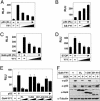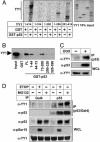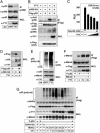YY1 inhibits the activation of the p53 tumor suppressor in response to genotoxic stress
- PMID: 15295102
- PMCID: PMC514451
- DOI: 10.1073/pnas.0402283101
YY1 inhibits the activation of the p53 tumor suppressor in response to genotoxic stress
Abstract
The tumor suppressor p53 regulates cell-cycle progression and apoptosis in response to genotoxic stress, and inactivation of p53 is a common feature of cancer cells. The levels and activity of p53 are tightly regulated by posttranslational modifications, including phosphorylation, ubiquitination, and acetylation. Here, we demonstrate that the transcription factor Yin Yang 1 (YY1) interacts with p53 and inhibits its transcriptional activity. We show that YY1 disrupts the interaction between p53 and the coactivator p300 and that expression of YY1 blocks p300-dependent acetylation and stabilization of p53. Furthermore, expression of YY1 inhibits the accumulation of p53 and the induction of p53 target genes in response to genotoxic stress. YY1 also interacts with Mdm2 and the expression of YY1 promotes the assembly of the p53-Mdm2 complex. Consequently, YY1 enhances Mdm2-mediated ubiquitination of p53. Inactivation of endogenous YY1 enhances the accumulation of p53 as well as the expression of p53 target genes in response to DNA damage, and it sensitizes cells to DNA damage-induced apoptosis. Hence, our results demonstrate that YY1 regulates the transcriptional activity, acetylation, ubiquitination, and stability of p53 by inhibiting its interaction with the coactivator p300 and by enhancing its interaction with the negative regulator Mdm2. YY1 may, therefore, be an important negative regulator of the p53 tumor suppressor in response to genotoxic stress.
Figures





Similar articles
-
MDM2 interaction with nuclear corepressor KAP1 contributes to p53 inactivation.EMBO J. 2005 Sep 21;24(18):3279-90. doi: 10.1038/sj.emboj.7600791. Epub 2005 Aug 18. EMBO J. 2005. PMID: 16107876 Free PMC article.
-
Inhibition of p53 degradation by Mdm2 acetylation.FEBS Lett. 2004 Mar 12;561(1-3):195-201. doi: 10.1016/S0014-5793(04)00168-1. FEBS Lett. 2004. PMID: 15013777
-
Yin Yang 1 is a negative regulator of p53.Cell. 2004 Jun 25;117(7):859-72. doi: 10.1016/j.cell.2004.06.004. Cell. 2004. PMID: 15210108
-
Transcription factors that interact with p53 and Mdm2.Int J Cancer. 2016 Apr 1;138(7):1577-85. doi: 10.1002/ijc.29663. Epub 2015 Jul 14. Int J Cancer. 2016. PMID: 26132471 Free PMC article. Review.
-
Molecular interaction map of the p53 and Mdm2 logic elements, which control the Off-On switch of p53 in response to DNA damage.Biochem Biophys Res Commun. 2005 Jun 10;331(3):816-27. doi: 10.1016/j.bbrc.2005.03.186. Biochem Biophys Res Commun. 2005. PMID: 15865937 Review.
Cited by
-
The Transcription Factor YY1 Is Essential for Normal DNA Repair and Cell Cycle in Human and Mouse β-Cells.Diabetes. 2022 Aug 1;71(8):1694-1705. doi: 10.2337/db21-0908. Diabetes. 2022. PMID: 35594378 Free PMC article.
-
Yin Yang 1 regulates the transcriptional activity of androgen receptor.Oncogene. 2009 Oct 22;28(42):3746-57. doi: 10.1038/onc.2009.231. Epub 2009 Aug 10. Oncogene. 2009. PMID: 19668226 Free PMC article.
-
Yin Yang 1 positively regulates BRCA1 and inhibits mammary cancer formation.Oncogene. 2012 Jan 5;31(1):116-27. doi: 10.1038/onc.2011.217. Epub 2011 Jun 13. Oncogene. 2012. PMID: 21666725 Free PMC article.
-
Endoplasmic reticulum stress accelerates p53 degradation by the cooperative actions of Hdm2 and glycogen synthase kinase 3beta.Mol Cell Biol. 2005 Nov;25(21):9392-405. doi: 10.1128/MCB.25.21.9392-9405.2005. Mol Cell Biol. 2005. PMID: 16227590 Free PMC article.
-
The MiR-135b-BMAL1-YY1 loop disturbs pancreatic clockwork to promote tumourigenesis and chemoresistance.Cell Death Dis. 2018 Feb 2;9(2):149. doi: 10.1038/s41419-017-0233-y. Cell Death Dis. 2018. PMID: 29396463 Free PMC article.
References
Publication types
MeSH terms
Substances
LinkOut - more resources
Full Text Sources
Research Materials
Miscellaneous

